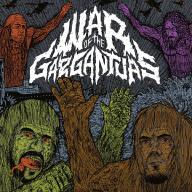Born on June 30, 1968, in New Orleans, Anselmo developed an admiration for heavy metal as a teenager, leading to his fronting several local bands in the '80s. Legend has it that one night the members of Pantera (guitarist Dimebag Darrell, drummer Vinnie Paul, and bassist Rex Brown) happened to go to a club in Louisiana that Anselmo frequented. Although Pantera had already established a following and issued several albums on their own (1983's Metal Magic, 1984's Projects in the Jungle, and 1985's I Am the Night), the band had grown weary of their Spinal Tap-ish musical direction with then-singer Terry Glaze, resulting in the dismissal of their frontman and a reevaluation of their approach. Anselmo and Pantera hit it off, and soon he was welcomed in as their new singer.
The first release by the Anselmo-led version of Pantera, 1988's Power Metal, wasn't up to the standard of future releases, however, but it was strong enough to land the quartet a recording contract with the Atlantic Records subsidiary EastWest. The group's look and sound quickly transformed from glam rock (à la Mötley Crüe) to straight-ahead thrash metal (Metallica), as evidenced by 1990's Cowboys from Hell. The album helped create a strong buzz with metalheads worldwide, which resulted in a pair of successful breakthrough releases that catapulted Pantera to the top of the metal heap: 1992's Vulgar Display of Power and 1994's Far Beyond Driven. Although it appeared on the surface as though this successful period would bring the bandmembers happiness, around this time Anselmo developed a substance abuse problem behind the scenes.
During a brief break from Pantera in 1995, Anselmo formed a side project, Down, along with Corrosion of Conformity's Pepper Keenan (guitar), Crowbar's Todd Strange (bass), and Eyehategod's Jimmy Bower (drums). With a sound slightly more melodic than Pantera and more aligned to classic rock/metal, the quartet issued a well-received debut album the same year, NOLA, before Anselmo returned to his full-time gig. However, a few months after the release of Pantera's 1996 release The Great Southern Trendkill (and just as a supporting tour got underway), Anselmo overdosed on heroin in July of the same year, and nearly died. Admirably, he refused to cancel the tour, and successfully rid himself of drug addiction on his own. Following the release of Pantera's first-ever live album, 1997's Official Live: 101 Proof, Anselmo concentrated on a non-musical project, launching his own interactive haunted house in Jefferson, Louisiana, called the House of Shock.
The same year that Pantera's fifth studio album with Anselmo was issued, 2000's Reinventing the Steel, the singer began releasing albums with a plethora of side projects. Such projects included Necrophagia (2000's Holocausto de la Morte and Legacy of Horror, Gore and Sickness, plus 2001's Cannibal Holocaust), Viking Crown (2000's Innocence from Hell and 2001's Banished Rhythmic Hate), Superjoint Ritual (2002's Use Once and Destroy), a second Down release (2002's Down II), Christ Inversion (a self-titled release), an acoustic outfit with his wife Opal called Southern Isolation (a 2001 self-titled EP), and a solo project, Philip H. Anselmo the Illegals (2013's Walk Through Exits Only and 2018's Choosing Mental Illness as a Virtue). As if his plate weren't full enough, Anselmo has even more on the horizon, including Eibon, Enoch, and Body Blood, and is said to be included on the debut recording by the much rumored and delayed Nine Inch Nails side project Tapeworm. In addition to his side projects and his work with Pantera, Anselmo has lent his vocal talents to recordings by other artists, including Vision of Disorder's Imprint, Biohazard's Uncivilization, Tony Iommi's Iommi, Anthrax's Volume 8: The Threat Is Real, and A.C.'s 40 More Reasons to Hate Us, among others. ~ Greg Prato, Rovi














